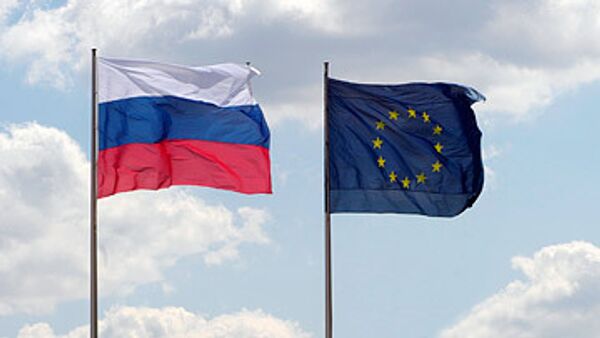MOSCOW. (RIA Novosti economic commentator Oleg Mityaev) - On the eve of the November 18 summit between Russia and the European Union in Stockholm, the Russian Energy Ministry prepared and sent to the European Commission a memorandum outlining the creation of an early warning system for energy affairs.
The memorandum calls for joint actions if Russian energy supplies to Europe are suspended, including if the interruption is caused by transit countries. Apart from improving energy dialogue with the EU, this document is designed to prevent Ukrainian President Viktor Yushchenko from unleashing yet another gas war with Russia.
The Russian Energy Ministry has announced its readiness to work with the EU to finish the memorandum by November 18 and sign it at the summit. The memorandum defines an "emergency situation" as any considerable decline in the amount of energy transported, stored, distributed or consumed, as determined by international law and bilateral agreements between Russian and the EU. Its "early warning mechanism" is a series of measures for anticipating potential energy problems and risks and responding promptly to any threat of an "emergency situation."
The agreement will focus on Russia-EU bilateral energy relations. The position of transit countries may be considered only if both the consumers and the exporters agree to do so.
The memorandum has more to do with diplomacy than the details of maintaining gas transit systems. For example, it describes what should be done if Ukraine stopped paying for gas and started illegally siphoning it off, and Russia shut off gas supplies in response.
However, it is the memorandum's diplomatic nature that may compel Ukraine to pay for gas. The EU has recently become one of the main sources of credit for the Ukrainian economy. EU officials are capable of exerting pressure on the Ukrainian president, which they demonstrated over the past weekend.
This time, a new gas war may be provoked by the Ukrainian presidential elections, which are scheduled for January 17, 2010. Gas contracts with Russia have already become a bargaining chip in the struggle for power between Viktor Yushchenko and Yulia Tymoshenko.
In late October, Tymoshenko even complained over the telephone to her Russian counterpart Vladimir Putin that Yushchenko had not allowed her to pay for the gas supplied to Ukraine in October.
In response, Yushchenko demanded that his government revise contracts for the purchase of Russian gas and its transit to Europe. He suggested cutting the amount of gas his country purchased by half and increasing the price of transporting 1,000 cubic meters of gas for 100 km from the current $1.70 to $2.60-$2.80. In his opinion, Ukraine's commitments are fixed more rigidly than those of Russia.
Yushchenko is suffering from low approval ratings and may benefit if Moscow shuts off gas supplies. This would help him unite his voters in the struggle against the artificially created enemy, Russia.
In theory, a new gas war could have started this week. November 9 was the deadline for Ukraine to pay for the Russian gas it consumed in October, and Kiev paid for it only at the last moment. Representatives for the Ukrainian president emphasized that their boss was not the cause for any delay in payment for Russian gas.
Apparently, Brussels also played a major role. Over the past weekend, European Commission President Jose Manuel Barroso asked Yushchenko by phone not to obstruct payment for Russian gas. He reminded the Ukrainian president that his country is not only a purchaser but also a link in supply of Russian gas to Europe, and Europeans should not suffer from thwarted supplies.
Now, even if the European Union does not accept the Russian memo on an early warning system for energy affairs in full, its sheer appearance will play into Russia's hand as it is trying to share with Europe the risks implied by gas transits via Ukraine.
The opinions expressed in this article are the author's and do not necessarily represent those of RIA Novosti.



